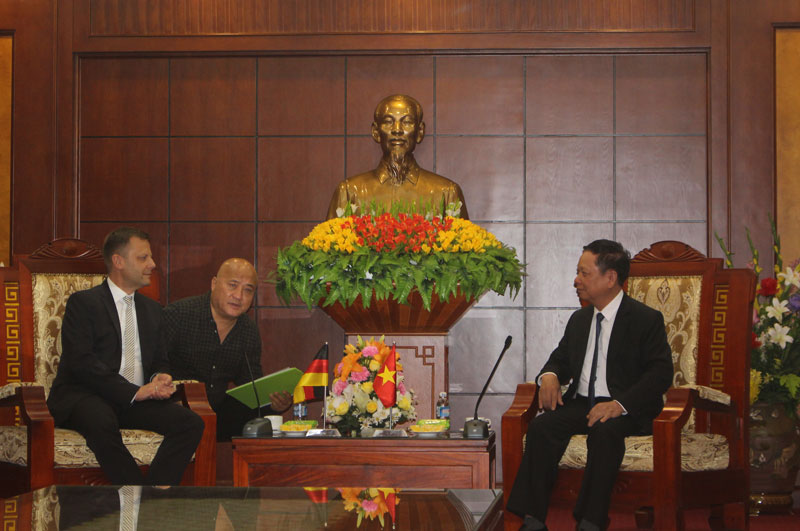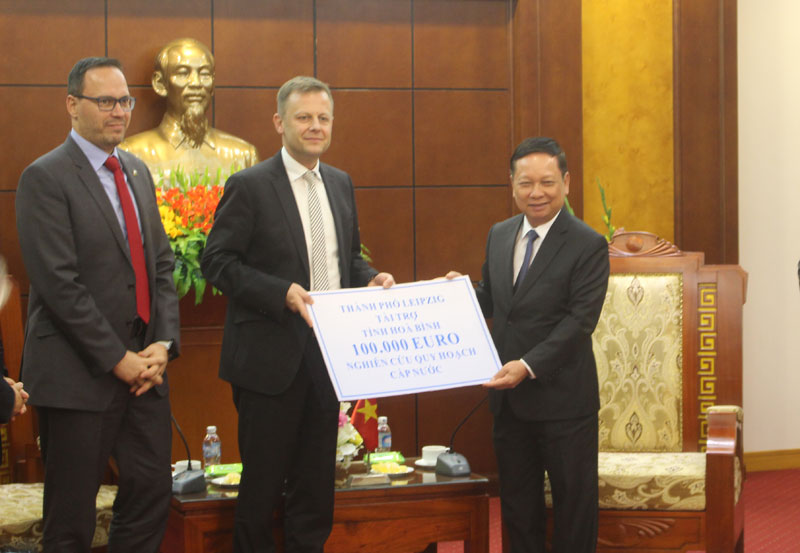
(HBO) – Torsten Bonew, Mayor of Germany’s Leipzig city, has led a delegation to visit the northern mountainous province of Hoa Binh.
He
was welcomed by Secretary of the provincial Party Committee Bui Van Tinh, Vice
Chairman of the provincial People’s Committee Nguyen Van Chuong, and
representatives of some local agencies.

Secretary of the
provincial Party Committee Bui Van Tinh greets Mayor of Leipzig city Torsten
Bonew.
At
the meeting, Tinh briefed his guests on Hoa Binh’s socio-economic situation as
well as its development targets, potential and advantages in agriculture,
tourism and energy.
He
also talked about environmental and energy technologies of the province, the
operation of Hoa Binh Clean Water JSC and the locality’s demand for
technological development in the time ahead.
Tinh
called on the German side to step up research and cooperation to set up a close,
sustainable relationship between Leipzig city and Hoa Binh province, while
helping Hoa Binh apply and develop energy and environmental technologies and speeding
up funding for water supply network planning in the locality.
Hoa
Binh will grant a decision on investment intention to Aqua One Water JSC to
build a factory specialising in water treatment and supply in southeastern
Hanoi at an investment promotion conference slated for December 11 in the
province. The 304 billion VND project has a designed capacity of 600,000 cu.m per
day and night.

Torsten Bonew, Mayor of
Leipzig city, hands over 100,000 EUR to help Hoa Binh with water supply
planning research.
The
German side introduced Leipzig city’s situation and its strength in water
treatment, energy development and agriculture, and highlighted effective cooperation
between the city and Vietnamese localities.
Torsten
Bonew lauded achievements of Vietnam and Hoa Binh in particular over the past
time, especially changes in the awareness of Vietnamese businesses and people of
environmental protection.
The
mayor expressed his hope that through high-quality, sustainable technologies, German
businesses would contribute to improving water quality for Vietnamese people,
and that the two sides will continue to promote cooperation for mutual
development.
On
this occasion, Torsten Bonew presented 100,000 EUR to support Hoa Binh in water
supply planning research./.
The Standing Board of the Hoa Binh provincial Party Committee has agreed in principle on a proposal by the Standing Board of the Party Committee of Hoa Binh city to gather feedback on the city’s 1:2000 zoning plan, which forms part of its broader urban development strategy.
Hoa Binh province has made notable progress in public administration reform and digital government development, with the satisfaction index among citizens and businesses reaching over 84%, according to recent government evaluations.
Thanks to great efforts by local authorities in recent times, the governance and public administration performance of Mai Chau district has been significantly improved.
In the afternoon of June 6, the Party Committee, the People's Council, the People's Committee and the Fatherland Front of Lac Son district solemnly held a meeting to celebrate the 139th anniversary of the district's founding (1886–2025) and the 79th anniversary of the establishment of the district's Party Committee (1946–2025). There was the attendance of Mr. Bui Van Thang, the Vice Chairman of the Provincial People's Council; Mr. Quach Tat Liem, the Vice Chairman of the Provincial People's Committee; Ms. Dang Bich Ngoc, the Deputy Head of the National Assembly Delegation of the province; as well as the former leaders of the province and district through various periods, who are the natives of the district.
Implementing the Politburo’s Resolution No. 57-NQ/TW on breakthroughs in science – technology, innovation, and digital transformation is a golden opportunity for the northern mountainous province of Hoa Binh to renew growth model, improve competitive edge and shorten digital gap.
Resolution 57-NQ/TW, issued by the Politburo on December 22, 2024, identifies sci-tech, innovation, and digital transformation as strategic breakthroughs to build a developed and prosperous nation. In Hoa Binh province, this spirit is not just a slogan, it’s being put into action through concrete initiatives that form a "new development triangle”: digital citizenship, digital economy, and digital administration.




